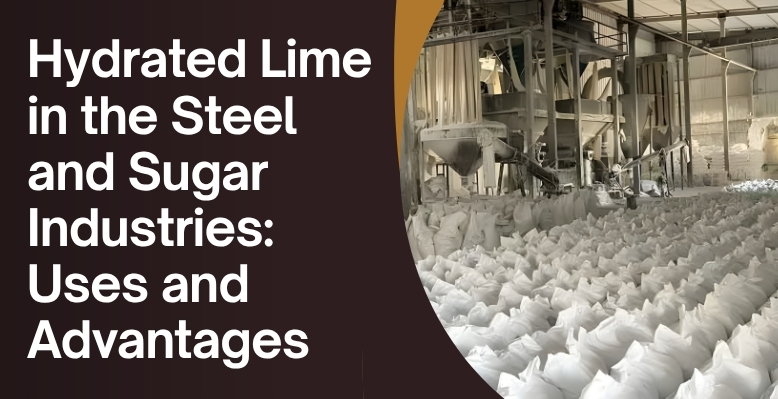
Hydrated Lime in the Steel and Sugar Industries: Uses and Advantages
Hydrated lime, also known as calcium hydroxide (Ca(OH)₂), is a key chemical used across several industries. Its versatile nature and powerful chemical properties make it highly valuable in steel and sugar production processes. Known for its ability to purify, neutralize, and enhance product quality, hydrated lime ensures efficiency, safety and sustainability in industrial operations.
In this blog, we will explore the uses of hydrated lime in steel industry, the application of hydrated lime in sugar industry, and the overall industrial advantages of hydrated lime.
What Is Hydrated Lime?
Hydrated lime is produced by mixing quicklime (calcium oxide) with water, resulting in a fine white powder with strong alkaline characteristics. It is widely used for neutralization, clarification, and chemical treatment in multiple sectors.
Because of its easy handling, affordability and effectiveness, hydrated lime for steel and sugar production is a preferred choice for improving process quality and performance.
Uses of Hydrated Lime in Steel Industry
In steel manufacturing, hydrated lime is an essential additive that plays a role in refining, gas treatment, and pollution control. Here are the primary uses of hydrated lime in the steel industry:
1. Slag Formation and Refining
Hydrated lime helps form slag during the refining process. The slag absorbs impurities like sulfur, silica, and phosphorus from molten metal, ensuring pure and high-quality steel production.
2. Desulphurization of Steel
Sulfur can make steel brittle. Hydrated lime reacts with sulfur to form calcium sulfide (CaS), which separates easily, thereby improving the toughness and durability of the steel.
3. Gas Cleaning and Environmental Treatment
In steel plants, hydrated lime is used to clean exhaust gases by absorbing pollutants such as sulfur dioxide (SO₂). It also neutralizes acidic wastewater, ensuring cleaner and safer disposal.
4. Furnace Protection
Hydrated lime forms a protective coating on furnace linings, reducing corrosion and extending the lifespan of industrial equipment. Overall, the uses of hydrated lime in the steel industry are indispensable for maintaining production quality and achieving cost-efficient steel output.
Application of Hydrated Lime in Sugar Industry
The Application of Hydrated Lime in Sugar Industry is primarily for purification and clarification. It ensures that the sugar produced is clean, colorless, and safe for consumption.
1. Juice Clarification:
After extracting juice from sugarcane, it contains various impurities like organic acids, proteins, and coloring matter. Hydrated lime is added to the juice to neutralize these impurities, forming insoluble compounds that can be filtered out easily.
2. pH Control:
Maintaining an optimal pH level is critical in sugar processing. Hydrated lime helps control acidity, preventing fermentation and improving crystallization during sugar refining.
3. Removal of Color and Impurities:
Hydrated lime helps in bleaching the sugar juice by reacting with color-producing compounds. This results in clearer and brighter sugar crystals.
4. Filtration and Efficiency:
The precipitates formed after liming make filtration faster and more efficient, saving time and improving overall productivity.
Thus, the application of hydrated lime in the sugar industry enhances both the quality and yield of sugar production.
Benefits of Hydrated Lime in Industrial Processes
The benefits of hydrated lime in industrial processes are extensive and vital for achieving cleaner, more efficient, and cost-effective manufacturing.
- Ensures high reactivity for quick and effective results.
- Enhances product quality and purity.
- Contributes to pollution control and sustainability.
- Offers cost-effective process improvements.
- Protects equipment and infrastructure from corrosion and scaling.
- 1. Cost Efficiency: Hydrated lime offers excellent performance at a lower cost, making it one of the most economical solutions for industrial purification and processing.
- 2. High Purity and Quality Output: It helps remove impurities and enhances product quality—whether it’s strong, clean steel or pure, white sugar.
- 3. Environmental Benefits: By neutralizing acidic waste and capturing harmful gases, hydrated lime reduces environmental pollution and ensures compliance with industrial emission standards.
- 4. Easy to Handle: Its fine texture and stable composition make hydrated lime easy to store, transport, and use in automated processes.
- 5. Long-Term Reliability: Its consistent performance across multiple industrial applications ensures operational stability and long-term efficiency.
Industrial Advantages of Hydrated Lime
Here are the main industrial advantages of hydrated lime that make it a preferred choice across industries:
From refining steel to purifying sugar, hydrated lime proves to be a multi-purpose industrial solution that boosts productivity and reduces waste.
Conclusion
Hydrated lime plays a crucial role in steel and sugar production. In the steel industry, the use of hydrated lime increases the efficiency of iron ore refining and improves the quality of the final product, and similarly, in the sugar industry, its use results in the production of high-quality, pure sugar.
The advantages of hydrated lime in industrial applications, including cost-effectiveness, durability and superior purification properties, make it essential for sustainable industrial development. For producers seeking to ensure quality and efficiency, hydrated lime offers unparalleled reliability and long-term value for steel and sugar production.
Frequently Asked Questions
Q1. What is hydrated lime used for in the steel industry?
Ans. Hydrated lime is used in the steel industry for refining molten metal, forming slag, removing impurities, desulphurization and neutralizing acidic waste gases and wastewater.
Q2. How does hydrated lime help in sugar manufacturing?
Ans. In sugar production, hydrated lime purifies raw juice by removing organic acids, non-sugars and coloring substances. It also adjusts pH levels to improve crystallization and sugar clarity.
Q3. Why is hydrated lime preferred in industrial processes?
Ans. Hydrated lime is preferred because it is affordable, effective and environmentally friendly. It ensures high reactivity, improves product quality and supports pollution control measures.
Q4. What are the main advantages of hydrated lime in industry?
Ans. The main advantages include cost efficiency, enhanced product purity, easy handling, reduced environmental impact and longer equipment lifespan.
Q5. Is hydrated lime environmentally safe to use?
Ans. Yes. Hydrated lime is eco-friendly, as it neutralizes acids, captures pollutants and minimizes industrial waste, contributing to cleaner and safer production processes.